Signalling an upswing in their strategic ties nearly four decades after the Indian Peace Keeping Force episode, India and Sri Lanka on Saturday inked a defence pact to institutionalise military cooperation with Prime Minister Narendra Modi asserting that security of both the nations is interlinked and dependent on each other.
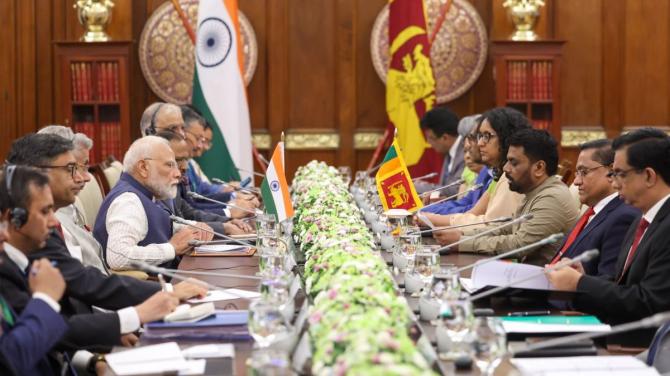
Following talks between PM Modi and Sri Lankan President Anura Kumara Dissanayake, the two sides firmed up a total of seven pacts, including one on developing Trincomalee as an energy hub under a trilateral framework, also involving the United Arab Emirates and another agreement on power grid connectivity.
While Modi reaffirmed that New Delhi will always stand with the people of the island nation, Dissanayake said Sri Lanka will not allow its territory to be used in any manner inimical to security interests of India as well as the region.
In the meeting, the prime minister pitched for resolving the vexed fishermen issue between the two countries with a 'humane approach' and hoped that Colombo will fulfil the aspirations of the Tamil people and conduct provincial council elections.
In his media statement, Modi said India converted loans worth more than $100 million into grants in the last six months alone to help Sri Lanka and announced reducing interest rates for loans given to the island nation.
Apart from the seven pacts, India also firmed up a debt restructuring agreement as part of its economic assistance for Colombo with Modi saying it will facilitate immediate assistance and relief to the people of Sri Lanka.
Modi also announced a support package of approximately 2.4 billion Sri Lankan rupees for social and economic development of the Eastern provinces of Sri Lanka.
In reflection of the importance Colombo has attached to Modi's visit, the prime minister was accorded a ceremonial welcome at the historic Independence Square and was conferred Sri Lanka's highest civilian honour, the Mithra Vibhushana.
Though the Modi-Dissanayake talks produced over 10 concrete outcomes, the defence cooperation pact emerged as the centerpiece as it signalled an upward trajectory in defence relations leaving behind the bitter chapter of India pulling out the Indian Peace Keeping Forces (IPKF) from the island nation around 35 years ago.
"We believe that we have shared security interests. The security of both countries is interconnected and co-dependent," Modi said.
"I am grateful to President Dissanayake for his sensitivity towards India's interests. We welcome the important agreements made in the area of defence cooperation," he said.
In his comments, the Sri Lankan leader said, "We also discussed in detail about furthering our collaboration in the already excellent defence cooperation between the two countries."
"I reaffirmed Sri Lanka's stance that it will not permit its territory to be used in any manner inimical to the security of India as well as regional stability."
Modi said India is proud to have fulfilled its duties as a 'true friendly neighbour'.
"Whether it was the terrorist attack of 2019, the COVID pandemic, or the recent economic crisis, we have stood firmly with the people of Sri Lanka during every difficulty," he said.
Modi also placed a wreath at the IPKF memorial in Colombo, paying tributes to the Indian soldiers who made supreme sacrifices during the intervention.
To a question on defence pact, Foreign Secretary Vikram Misri said at a media briefing that it is an umbrella framework that will make existing defence cooperation initiatives 'more structured' even as he talked about 'close convergence' in the narratives from both sides on 'completely interlinked' nature of the national security.
"In fact, if I recall correctly during discussions today, he said that neither Sri Lanka's land nor the oceans around it will be allowed to be used in any manner inimical to India's security," he said.
Misri said the defence pact will provide for more joint exercises, capacity building, increasing port calls by naval units of both countries, and could also facilitate defence industry cooperation between the two sides.
The other notable pacts included one on cooperation in the field of sharing digital solutions and another on India's multi-sectoral grant assistance for the Eastern province.
Modi also announced a comprehensive capacity-building programme for 700 Sri Lankans annually, India's grant assistance for the development of Thirukoneswaram temple in Trincomalee, Sita Eliya temple in Nuwara Eliya, and Sacred City Complex project in Anuradhapura.
The prime minister said relations between India and Sri Lanka are based on mutual trust and goodwill and both sides will continue to work together to fulfill the hopes and aspirations of people of the two countries.
"President Dissanayake chose India for his first foreign visit after becoming president, and I have had the privilege of becoming his first foreign guest. This is a symbol of the depth of our special relations," Modi said.
"Sri Lanka has a special place in both our 'Neighbourhood First Policy' and Vision 'MAHASAGAR'. In the last four months, since President Dissanayake's visit to India, we have made significant progress in our cooperation," he added.
Modi had last month announced India's new vision for the Global South and named it 'MAHASAGAR' or Mutual and Holistic Advancement for Security and Growth Across Regions.
After their talks, Modi and Dissanayake also virtually inaugurated the Sampur solar power plant and a number of other India-assisted projects.
"The Sampur solar power plant will help Sri Lanka achieve energy security. The agreement reached to build a multi-product pipeline, and to develop Trincomalee as an energy hub will benefit all Sri Lankans," Modi said.
"The grid interconnectivity agreement between the two countries will create opportunities for Sri Lanka to export electricity," he added.
Modi said India will also provide support for the Sri Lanka Unique Digital Identity project.
In his remarks, the prime minister also referred to the fishermen issue.
"We also discussed issues related to fishermen's livelihood. We agreed that we should proceed with a humane approach in this matter," he said.
"We also emphasised on immediate release of the fishermen and their boats."
Referring to the Tamil issue, the prime minister also hoped that the Sri Lankan government will 'fully implement' the Constitution of the country.
"We also talked about reconstruction and reconciliation in Sri Lanka. President Dissanayake appraised me of his inclusive approach," Modi said.
"We hope that the Sri Lankan government will meet the aspirations of the Tamil people and fulfil its commitment towards fully implementing the Constitution of Sri Lanka, and conducting provincial council elections," he said.
Modi also met a group of Tamil leaders from Northern and Eastern provinces of Sri Lanka and reiterated India's 'unwavering commitment' to 'a life of equality, dignity and justice' for the Tamil community within an united Sri Lanka.
The Tamil community in Sri Lanka has been demanding the implementation of the 13th Amendment that provides for devolution of power to it. The 13th Amendment was brought in after the Indo-Sri Lankan agreement of 1987.
Modi also talked about India's assistance to Sri Lanka to help it come out of the economic stress.
"In the last six months alone, we have converted loans worth more than $100 million into grants. Our bilateral 'debt restructuring agreement' will provide immediate assistance and relief to the people of Sri Lanka. Today we have also decided to reduce interest rates," he said.
"It symbolises that even today, India stands with the people of Sri Lanka," he said.
The prime minister also talked about the Buddhist links between the two nations.
"I am extremely happy to announce that the Holy Relics of Lord Buddha found in 1960, in the Aravali region of my home state - Gujarat, are being sent to Sri Lanka for an exposition," he said.
"India will assist in the renovation of the Thirukoneswaram Temple in Trincomalee. India will also provide support in the construction of the sacred city in the Anuradhapura Mahabodhi temple complex, and the Sita Eliya temple in Nuwara Eliya," he added.
The Modi-Dissanayake talks were held a day after the prime minister arrived in the Sri Lankan capital after concluding his trip to Bangkok where he attended a summit of the BIMSTEC (Bay of Bengal Initiative for Multi-Sectoral Technical and Economic Cooperation).
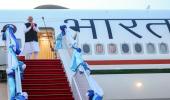
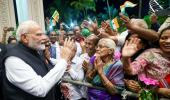
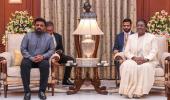
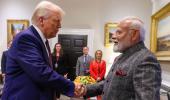
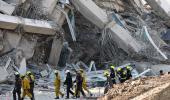






 © 2025
© 2025